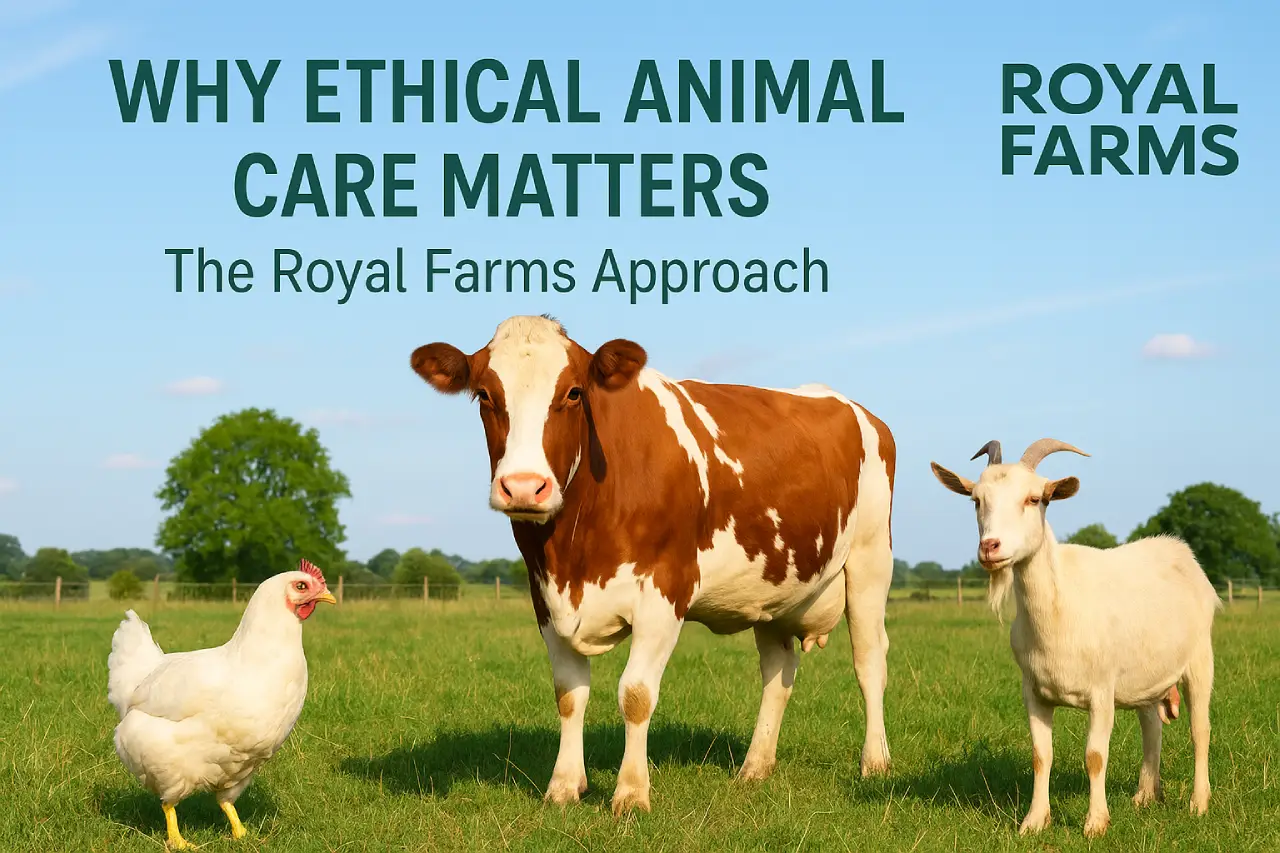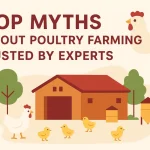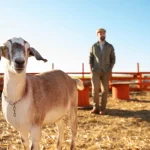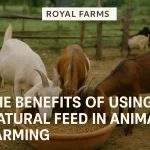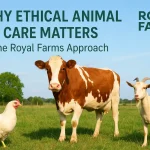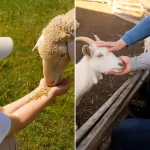At Royal Farms, we believe that ethical animal care is not just a responsibility — it’s a philosophy that defines how we nurture, manage, and sustain life on our farms. Every animal under our care is treated with compassion, respect, and dignity. Our farming methods are rooted in the principle that healthy, stress-free animals create a better and more sustainable agricultural future.
1. Understanding Ethical Animal Care
Table of Contents
ToggleEthical animal care goes beyond providing food and shelter. It involves creating an environment where animals can live comfortably, express natural behaviours, and remain free from unnecessary stress or suffering. At Royal Farms, we consider every aspect of animal welfare — from clean housing and balanced nutrition to healthcare and humane handling.
This approach ensures that every animal, whether poultry, cattle, or goats, receives the attention and care it deserves. When animals are healthy and happy, their productivity naturally improves, leading to higher-quality output and long-term sustainability for our farming operations.
2. The Royal Farms Way: Care, Comfort, and Compassion
At Royal Farms, our operations are designed around animal comfort and well-being. Here’s how we maintain our ethical standards across different divisions of our farm:
Poultry Integration with EC Sheds
Our poultry units are managed in environment-controlled sheds that ensure optimal temperature, humidity, and ventilation. These conditions minimize stress, prevent disease, and promote better growth. Each bird is raised in a hygienic and comfortable setting where welfare comes before quantity.
Cattle Operations
We carefully select high-quality milking cows and maintain them in well-kept, clean, and safe spaces. Our cattle receive balanced feed and round-the-clock attention from skilled caretakers. We focus on natural feeding practices that keep the cows healthy while ensuring premium milk yield without resorting to harmful chemicals or shortcuts.
Sheep & Goat Farming
Sheep and goats are sensitive animals that need warmth, space, and routine health monitoring. We provide proper housing, a natural diet, and regular check-ups to ensure their comfort. Ethical rearing practices help us maintain strong, disease-free herds and support sustainable meat production.
3. Why Ethical Animal Care Matters
Ethical animal care is crucial for multiple reasons — moral, economic, and environmental.
- Healthier Animals, Better Output: Animals raised in clean, calm, and cruelty-free environments are more productive and produce higher-quality meat, milk, or eggs.
- Sustainability: By focusing on welfare, we reduce the need for harmful antibiotics and chemicals, which protects both animal and human health.
- Trust and Transparency: Consumers today value honesty and ethics. Our commitment to humane practices builds confidence in our brand and the food we produce.
- Economic Stability: Healthy animals reduce operational risks, veterinary costs, and losses, ensuring long-term business growth.
At Royal Farms, these values are more than ideals — they’re measurable practices that benefit animals, farmers, and consumers alike.
4. The Principles Behind Our Ethical Farming Practices
Ethical animal care requires consistency and responsibility. Our approach is guided by a few key principles:
- Natural Feeding: We use chemical-free, organic feed to ensure that our animals grow naturally and stay healthy.
- Stress-Free Living: We maintain calm, spacious environments where animals can move freely and live comfortably.
- Preventive Healthcare: Regular health checks and vaccinations help us prevent diseases rather than treat them after they occur.
- Clean Environment: Hygiene is maintained at every level — from bedding to feed storage — ensuring the animals live in safe and sanitary conditions.
- Transparency: We uphold full honesty in our processes, ensuring that both farmers and partners understand how we care for our livestock.
5. The Long-Term Impact of Ethical Animal Care
Ethical farming benefits not only the animals but also the people and communities connected to agriculture. It creates a ripple effect — healthier livestock means safer food, stronger markets, and more sustainable livelihoods.
At Royal Farms, we see every animal as a part of our extended family. Their comfort and well-being directly reflect the quality and integrity of our work. This approach helps us maintain high productivity while staying true to our values of compassion, purity, and trust.
Conclusion
Ethical animal care is at the heart of everything we do at Royal Farms. Our practices are built on respect for life, a dedication to sustainability, and a vision for a better, more humane agricultural future. By prioritizing animal welfare, we create not just better products — but a better way of farming.
At Royal Farms, ethical care isn’t a trend. It’s a tradition — one that defines who we are and how we contribute to a more responsible farming industry.

